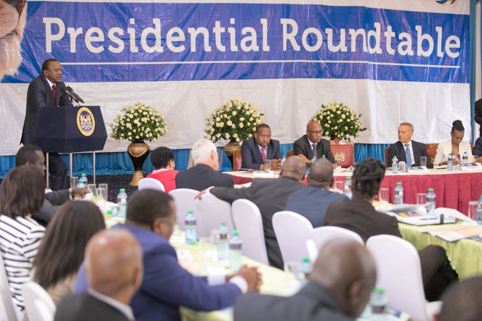Eighth Presidential Round Table
Kenya private sector alliance held the 8th presidential round table at statehouse Nairobi on 10th May 2018, under the chairmanship of H.E President Uhuru Kenyatta. This was the first presidential round table for the year 2018. The major focus was on the BIG 4 Agenda with an objective of structuring the way forward to strengthen private sector participation. This being the second and last term for President Uhuru Kenyatta, provided and opportunity for the private sector, to align it’s business Agenda with the government Agenda to enhance collaboration towards common goals.
The meeting was moderated by Mr. Waita Nzioka, chief of Staff who welcomed both the private sector and the government for very informative and enlightening discussion. This was also reiterated by Cabinet Secretary, Ministry of Industry, Trade and Cooperatives Hon. Adan Mohamed.
Ms. Carole Kariuki – CEO KEPSA introduced KEPSA to the attendees where he highlighted the improvements achieved through the partnership with the government to improve the business environment and the path to ranking position 50 and below on the Ease of Doing Business from the current position 80. She however highlighted that the private sector has put a major focus on an economy led transformation towards realization of the Vision 2030 goals.
Ms. Kariuki mentioned that the BIG 4 Agenda presents numerous opportunities for private sector investment including SMEs and therefore the need to strengthen the engagement and partnership with the government through the various Public Private Dialogue (PPD) platforms towards unlocking these opportunities.
‘Implementation of BIG 4 Agenda, will see many job creation’ this was the presidents directive while vision casting the BIG 4 Agenda for his second and last term. Mr. Macharia – KEPSA Chair, ICT sector board presented overview of the Ajira Digital Project whose Vision is to create 1 million online jobs through training and mentorships owing to growing demand among the youth for online jobs. 7,168 youth had been trained on the Ajira Digital project in 2017. Mr. Macharia emphasized the need for partnership between the government and the private sector in developing the skills required for the BIG 4 and development of jobs with long term sustainability at the local level (Ajira Mashinani). He proposed creation of jobs portal for mapping available skills, job experience and the job markets to enhance linkages.
Ms. Flora Mutahi, chair – KAM highlighted the current situation of the manufacturing sector noting declining growth (at 3%) and low contribution to GDP which currently stands at 8.4%, low value addition, low cadre jobs creation. The main bottlenecks constraining manufacturing competitiveness include high energy costs, Import Declaration Fee (IDF) and Railway Development Levy (RDL) taxes on raw materials, low labour productivity, delayed payments, multiple charges, inefficient logistics and low access to affordable credit all which affect firm level competitiveness. In accessing markets, the main challenge is illicit trade and poor access to local markets, regional and global markets. At policy level, the main hindrance to manufacturers is the lack of predictability due to ad-hoc policies.
The meeting majorly focused on how to improve the manufacturing industry that will also see many job creation. Some of the proposed pointers for improving the manufacturing industry were; Provide Quality and Affordable Energy, Removal of IDF & RDL from raw materials, industrial input and machinery and increasing them imported finished goods, Low industry labour productivity, Delayed payments, Ad-hoc Policy Processes disrupting manufacturing, Global Market – create market access, Ensure trade flows as per EAC Protocol on Rules of Origin awaiting verification, Purchase minimum 40% & publicly report especially on Big Four Agenda contracts.
It was agreed that in the next PRT meeting, Affordable housing will be the main Agenda, hence all the key players to prepare their presentations. Affordable Healthcare will be discussed in the third PRT meeting while food security will be the last one.
Ms. Carole Kariuki – KEPSA CEO highlighted the five key areas that are of deep concern to the private sector in the implementation of the BIG 4. These include: Access to clean affordable and reliable energy; Governance (dealing with corruption, bribery, impunity and wastages); improving the business environment in Nairobi county which contributes 60% of the country’s GDP and sets the pace for other counties, enhancing access to affordable finance for businesses especially SMEs; comprehensive review of the PPP Act, and improving policy environment predictability. The CEO noted that resolving these issues would be a crucial enabler to enhance private sector participation in the BIG 4.
The Chairman appreciated the government led by His Excellency for meeting the private sector for the 8th Presidential Roundtable to resolve the business issues that may hinder private sector participation in the BIG 4. He took note of previous engagements with the President and MSFs that had led to great success in resolving issues presented in the NBA-II. He called for more collaboration and partnership in implementing the third NBA and the BIG 4 Agenda. Addressing corruption which is the biggest challenge at present, policy reforms to improve the business environment to position 50 and below, digitization of government systems, adoption of modern technologies (Block chain, Artificial Intelligence, etc.), addressing the obstacles to business competitiveness such as access to reliable, clean and affordable energy, access to financing and market linkages are some of the areas that need to be prioritized. The chairman proposed that MSFs be held every 4-6 weeks and not more than eight weeks to resolve various business issues.

In his closing remarks, president noted that the leaders present at the PRT were the only ones with the capacity to make a difference for the rest of the Kenyans. He noted that the government cannot achieve its objectives alone but rather with the support of the private sector.
The president emphasized on the need for collaboration in fighting corruption, and inaction by leaders. “it is up to the government and the private sector to say we have reached an end to this problem” he said.
He urged everyone to avoid shortcuts, expressed his government’s commitment to creating an enabling environment for genuine business to thrive and urged everyone to report all incidences of corruption through the hotline “0791333222” which he committed to personally follow up and act.
President Uhuru asked the leaders to help the government in facilitating the private sector to help grow the country and achieve the BIG 4 agenda. He noted that the 8th PRT was a start; continuous engagement will focus on finding solutions to getting manufacturing contribution to GDP to 15% from the current 8.4%. The Cabinet Secretaries and other government leaders were reminded that they were entrusted with running their offices on behalf of the government and any failure would not be tolerated.
The meeting was well attended by Cabinet Secretaries, Chief Administrative Secretaries, Principal Secretaries, leaders of State Agencies and private sector representatives.
